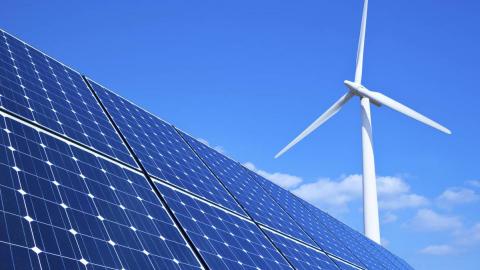
A new report by CSIRO, Australia’s national science agency, shows existing technologies will enable Australia to halve emissions by 2030 from 2020 levels, under a rapid decarbonisation scenario led by a renewable electricity sector.
The report, Pathways to Net Zero Emissions – An Australian Perspective on Rapid Decarbonisation, emphasises that an accelerated transition is needed across the economy if we are to meet the goal of net zero before 2050 and limit global warming to 1.5°C.
CSIRO’s Rapid Decarbonisation scenario projects key milestones in 10-year timesteps that would set Australia on a path to net zero by 2050.
Using existing technologies, Australia can reduce emissions by 52 per cent from 2020 levels by 2030. Beyond that, however, technologies currently in early development would need to be in widespread commercial use into the 2030s and 2040s, particularly to address hard-to-abate sectors.
The investment costs will be substantial, and the role of the finance sector will be critical.
Immense opportunities
CSIRO’s Executive Director – Environment, Energy and Resources, Dr Peter Mayfield, said there were immense opportunities for Australia to grow new and existing industries and provide essential innovation to decarbonise the world.
‘Pressure is mounting for business to speed up its efforts towards net zero and lead the way for the rest of the country. How to move faster to deliver a cleaner, sustainable and strong economy is the question on every business leader’s mind,’ he said.
‘This work will help business find a rapid and achievable pathway to net zero appropriate to their sector – guiding investment to mitigate climate change, reinventing industries of old, and creating new jobs in emerging industries.’
CSIRO researchers applied to an Australian context the International Energy Agency’s global analysis of the technology, energy and investment needed to limit global warming to 1.5°C.
This is the first time that IEA’s detailed international modelling has been coupled with CSIRO’s detailed knowledge of Australian industry to inform decarbonisation projections of the economy in this way.
Modelling focused on the high emissions sectors of the economy to develop transition pathways across energy, transport, building and heavy industry, including steel, cement and aluminium; alongside agriculture, the largest energy emitters in the economy.
Renewable electricity
The report’s Rapid Decarbonisation scenario projects the national effort will be led by a renewable electricity sector, suggesting renewable sources would need to triple by 2030 to reach 90 per cent of the electricity generation mix.

To achieve this, almost all new capacity installed in the next decade would need to come from wind, solar and hydropower supported by increased storage capacity.
Rapid electricity sector decarbonisation is projected to drive down emissions from energy use in housing and commercial buildings, followed by electrification in mining, and later in transport. This highlights the need for more renewable electricity sooner.
The report suggests that by 2040, 73 percent of cars and light commercial vehicles on the road will be electric powered. Decarbonisation of long distance and heavy transport accelerates through 2030-2040.
CSIRO says that to lag behind international decarbonisation would be a competitive disadvantage for Australia, as other nations increasingly adopt low emissions technologies and trade barriers towards high emitting nations.
Funded by the Commonwealth Bank of Australia (CBA), the new report will support evidence-based decision making for CBA, its clients and the banking and business sectors more broadly.





I believe most observant readers will be aware that ” net zero by 2050.” is a joke.
‘Net zero’ means no improvement,
…but increased pollution ‘off-set’ with those totally dubious carbon credit schemes, that are designed to employ fraudulent methods conducted by scammers and validated by extremely creative accounting by the government.
To have any positive effect CO2 must be REDUCED and removed from the atmosphere, but don’t be fooled by ‘carbon capture and storage’
this does not work and never will work ( but if it did, it would be as hazardous as Nuclear Waste, any oxygen-breathing organism within thousands of miles of an industrial scale storage site, would die if there was a catastrophic leak.) but thankfully , even with the millions invested by Government they can’t be made to work, and certainly not in a commercially viable manner.
Remember the CSIRO is now bought and paid for by industry and has as much credibility as the tobacco industry.
Cheers, G”)
In the mind of our demented energy minister blackout Bowen we can achieve nett zero by 2050, unfortunately the process that will take place to achieve this WEF, IPCC induced socialist goal will have us living back in the stone age. Klaus Schwab will be extremely elated as all of his communist agenda will be reality, everyone will own nothing and be happy, the next step will include computer chip insertion of the world population, hey don’t laugh, it’s well documented that this madman has these intentions.
Did you watch President Milei’s speech at the WEF? Mic drop!
Fortunately the socialist rabble has begun to show it’s true colours and people around the world have started to realise this, they are tired of the woke fools in governments and now seek help and stability from liberal democracies. The worm is definately beginning to turn. The UN and WEF are on the nose.
If the economy under Albo and friends continues no one will be able to afford to turn the lights on or even think about buying a toy electric vehicle. Maybe that is their ultimate goal, a sure way to reduce carbon dioxide. I suggest if Albo and front bench stopped exhaling CO2 the country would be in much better shape.
If the economy under Albo and friends continues no one will be able to afford to turn the lights on or even think about buying a toy electric vehicle. Maybe that is their ultimate goal, a sure way to reduce carbon dioxide. I suggest if Albo and front bench stopped exhaling CO2 the country would be in much better shape..